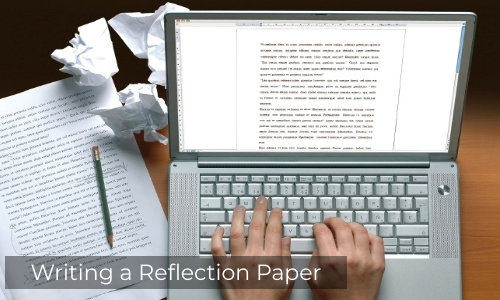
Writing a Reflection Paper
With the growing modern trends in society as well as the education sector, students are often assigned to write assignments based on a movie, a book or an event. This task comes under the category of reflective writing, where students indulge in the process of deep thinking and exploring great ideas and thoughts. They are told to scribe their own thoughts by putting them to words in a reflective paper.
With the help of the reflective writing process, students learn to express their own thoughts and opinions. They further articulate these observations in the form of a summary so that readers can get a clear picture of how you feel about something. Though at first, it may sound quite easy to you, but it is quite a challenging task when it comes to pinning down your thoughts and opinions on a paper. And because of all the hardships involved behind the reality of complex topics and difficulty in compiling a reflective paper, students easily give up on it and end up harming their grades no matter what. However, with correct guidance and quality academic help from experienced assignment writers, you can easily win this battle.
It is because of this reflection paper, you get the opportunity to express yourself, scribe your personal opinions and experiences, which further teaches you to shape your thinking and observations and put them into words. The biggest challenge that students face these days is that they are clueless about starting a reflective paper and concluding it on a good note. So, here we have provided everything that you need to consider before submitting an excellent reflective paper.
Structure of the Reflection Paper
Brainstorming the topic
Though many of you might start your paper with great vigor and confidence, but soon you get stuck at the very step of compiling your paper, i.e. coming up with a great topic. All you need to do is choose a topic that is close to your heart because that is the only possible way that will make your writing quite personal and compelling.
Creating a mind-map
Once you’ve chosen a topic and collected great details about it, now is the time to process mind-mapping. Under this step, you are told to identify your main ideas and arguments that will help support your thoughts and opinions. Creating a mind map helps you to connect with your ideas within the bounds of the central purpose of your reflection paper.
Writing the introduction
Like any other piece of writing, your reflection paper should also include a well-structured introduction. Writing a strong, compelling paragraph in the opening part is necessary for your paper as it sets the tone of the reflective piece. The introduction part appears first before the eyes of readers, so make sure that it is quite gripping and engaging. Under this part, you are required to identify the expectations that you had from reading or describe the experience of some events right at the beginning.
Developing a thesis statement
The next thing that you need to focus on is your thesis statement. Make sure that your thesis statement looks quite precise and simple. With the help of your thesis statement, you should be able to communicate well with the readers, explaining them in brief about your experience. It is the most important part to be considered in a thesis paper, as it helps bridge the gap between your expectations and reality.
Writing the conclusion
Your conclusion part needs to be in sync with the main body paragraphs and should be able to explain the final overview of your paper. Remember to provide some valid proof at the end to back up the claims you arrived at. And while it should be kept short in length, you must include a concluding line for every paragraph of the reflective paper.
Writing style of the Reflection Paper
Keep it short and simple – Your reflection paper should be short and precise in nature. Maintain a word count between 300 to 700, do not exceed more than that. Although a reflection paper tends to reflect your personal overview of an event, you are still required to maintain a formal-academic tone throughout the paper.
Use relevant and relatable information – Make sure that you are wise enough when it comes to choosing the details of the things that need to be included in your paper. So you need to ensure that the details included in your paper are quite relevant and relatable to the piece.
Review your paper– After you’ve finished writing your paper, make sure that you review it once before final submission. Proofread every section of your paper thoroughly and make suitable changes before moving further.





